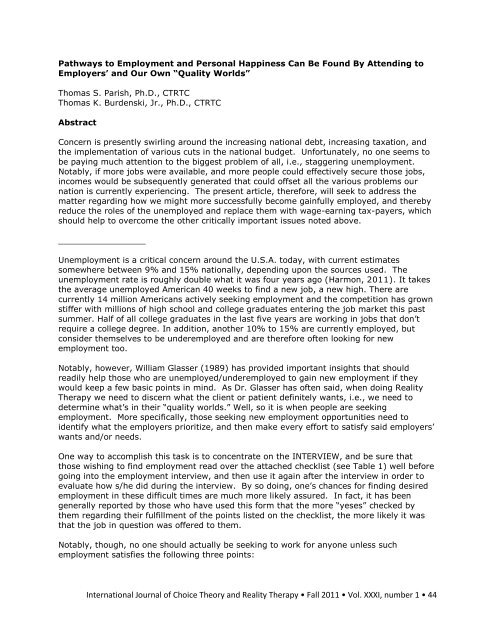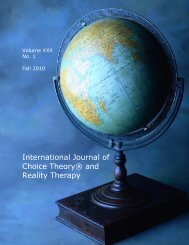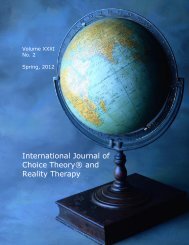International Journal of Choice Theory® and Reality ... - CTRTJournal
International Journal of Choice Theory® and Reality ... - CTRTJournal
International Journal of Choice Theory® and Reality ... - CTRTJournal
You also want an ePaper? Increase the reach of your titles
YUMPU automatically turns print PDFs into web optimized ePapers that Google loves.
Pathways to Employment <strong>and</strong> Personal Happiness Can Be Found By Attending to<br />
Employers’ <strong>and</strong> Our Own “Quality Worlds”<br />
Thomas S. Parish, Ph.D., CTRTC<br />
Thomas K. Burdenski, Jr., Ph.D., CTRTC<br />
Abstract<br />
Concern is presently swirling around the increasing national debt, increasing taxation, <strong>and</strong><br />
the implementation <strong>of</strong> various cuts in the national budget. Unfortunately, no one seems to<br />
be paying much attention to the biggest problem <strong>of</strong> all, i.e., staggering unemployment.<br />
Notably, if more jobs were available, <strong>and</strong> more people could effectively secure those jobs,<br />
incomes would be subsequently generated that could <strong>of</strong>fset all the various problems our<br />
nation is currently experiencing. The present article, therefore, will seek to address the<br />
matter regarding how we might more successfully become gainfully employed, <strong>and</strong> thereby<br />
reduce the roles <strong>of</strong> the unemployed <strong>and</strong> replace them with wage-earning tax-payers, which<br />
should help to overcome the other critically important issues noted above.<br />
_________________<br />
Unemployment is a critical concern around the U.S.A. today, with current estimates<br />
somewhere between 9% <strong>and</strong> 15% nationally, depending upon the sources used. The<br />
unemployment rate is roughly double what it was four years ago (Harmon, 2011). It takes<br />
the average unemployed American 40 weeks to find a new job, a new high. There are<br />
currently 14 million Americans actively seeking employment <strong>and</strong> the competition has grown<br />
stiffer with millions <strong>of</strong> high school <strong>and</strong> college graduates entering the job market this past<br />
summer. Half <strong>of</strong> all college graduates in the last five years are working in jobs that don‘t<br />
require a college degree. In addition, another 10% to 15% are currently employed, but<br />
consider themselves to be underemployed <strong>and</strong> are therefore <strong>of</strong>ten looking for new<br />
employment too.<br />
Notably, however, William Glasser (1989) has provided important insights that should<br />
readily help those who are unemployed/underemployed to gain new employment if they<br />
would keep a few basic points in mind. As Dr. Glasser has <strong>of</strong>ten said, when doing <strong>Reality</strong><br />
Therapy we need to discern what the client or patient definitely wants, i.e., we need to<br />
determine what‘s in their ―quality worlds.‖ Well, so it is when people are seeking<br />
employment. More specifically, those seeking new employment opportunities need to<br />
identify what the employers prioritize, <strong>and</strong> then make every effort to satisfy said employers‘<br />
wants <strong>and</strong>/or needs.<br />
One way to accomplish this task is to concentrate on the INTERVIEW, <strong>and</strong> be sure that<br />
those wishing to find employment read over the attached checklist (see Table 1) well before<br />
going into the employment interview, <strong>and</strong> then use it again after the interview in order to<br />
evaluate how s/he did during the interview. By so doing, one‘s chances for finding desired<br />
employment in these difficult times are much more likely assured. In fact, it has been<br />
generally reported by those who have used this form that the more ―yeses‖ checked by<br />
them regarding their fulfillment <strong>of</strong> the points listed on the checklist, the more likely it was<br />
that the job in question was <strong>of</strong>fered to them.<br />
Notably, though, no one should actually be seeking to work for anyone unless such<br />
employment satisfies the following three points:<br />
<strong>International</strong> <strong>Journal</strong> <strong>of</strong> <strong>Choice</strong> Theory <strong>and</strong> <strong>Reality</strong> Therapy • Fall 2011 • Vol. XXXI, number 1 • 44




